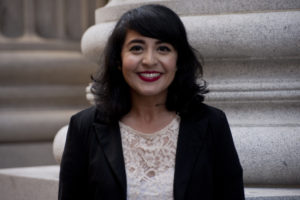Learning to Listen to the Voices that Matter
Mayra Sierra is the Community Partnerships + Inclusion Manager at Tipping Point Community. Mayra’s career has focused on raising the voices of those most often marginalized, to dismantle socioeconomic barriers and democratize knowledge. After graduating and attaining her master’s in Museum Studies from John F. Kennedy University, she traveled the country with StoryCorps, recording oral histories and bearing witness to people’s lives. Before joining Tipping Point Community, she worked at Planned Parenthood of Southern New England in New Haven, Connecticut, organizing with the Latinx communities around reproductive rights.
My name is Mayra Sierra and I’m the Community Partnerships + Inclusion Manager for Tipping Point Community’s Chronic Homelessness Initiative (CHI). Storytelling has always fascinated me—the ability to learn and truly understand another person’s experience in a way that bridges empathy, and ultimately connects our humanities.
My career has centered around the powerful notion of listening and bearing witness to someone by way of storytelling. At StoryCorps, a nonprofit that facilitates and records conversations that are archived in the Library of Congress, I learned a lot about the importance of listening. During my time there, I traveled the country recording people’s stories from an AirStream trailer that was outfitted as a recording studio. The opportunity to listen to people from all walks of life , our commonalities and our differences was invaluable. There is true power in listening and connecting. Even today, I still feel some of the connections and know that I will always carry those stories with me.
When I started at CHI, I knew that centering the lives and experiences of those most impacted by homelessness was imperative. We not only had to uplift their stories, but also utilize their expertise to influence and inform the work—only through their insights can we find solutions to homelessness.
That’s why I developed the Community Advisory Board (CAB). The CAB is a group of individuals who are currently, or have experienced, homelessness in San Francisco. Every member of the advisory board is a fierce advocate and each has been working toward solutions to homelessness for a long time. They are the real experts. People with lived experience whose insights and proximity to the issue are assets that are acknowledged and compensated. People with lived expertise know the solutions to their homelessness, they know their situation better than any study can ever quantify.
Members of the CAB are fighting not only for themselves, but for friends, family and people who share a similar story. I’m in constant awe of the CAB’s dedication, courage, and leadership.
Meet some of the members of our Community Advisory Board!
What they bring to the table— in their own words.
The CAB reminds us of the human aspect of homelessness— that behind the numbers and data are real people. The CAB ensures that our work remains focused on the real life consequences of our decisions and investments. In my role, one of the most important things I’ve learned is that it’s not enough to create a seat at the table for people with lived expertise. You also have to make sure the person you’re inviting to occupy that seat feels included, safe, and heard while seated. For the members of the CAB, the reality of homelessness is all around them—many live in neighborhoods where their neighbors are unhoused. Neighbors that they care about and are fighting for.
The CAB has shown me that though solutions to homelessness are complex, they’re possible, especially with a housing first model. Getting people into stable housing is the first step towards addressing the myriad of issues that can lead to someone becoming homeless in the first place.
And, when it comes to the tired trope of a person being “service resistant,” the CAB constantly reminds me that it’s really the services that are resistant to the individual. People experiencing homelessness are not a monolithic group where one solution fits all. On the contrary, everyone’s story is different and if we want to make real progress toward solutions to homelessness in our city, it is our responsibility to listen with love and compassion to see what solution will begin each person’s healing process.
We must advocate pushing for solutions that are inclusive and recognize the complexities of someone’s individual experience. I invite you to remember every single unhoused person you see on the street has a story and that story matters. They matter, and we’ll only see success in our efforts when we learn to listen.

Mayra Sierra

